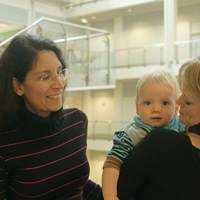A researcher at The University of Western Australia has been awarded two major international grants to carry out further investigations into human breast milk.
Assistant Professor Foteini Hassiotou of UWA's Hartmann Human Lactation Research Group won an American Association of Anatomists Postdoctoral Fellowship to examine new horizons for regenerative medicine using breast milk stem cells.
She also won almost $900,000 from the Swiss group Medela AG to illuminate the life-giving properties of human milk.
Assistant Professor Hassiotou is an important member of international collaborations looking not only at lactation but also the potential of breast stem cells to be used as models in breast cancer research and to be harnessed in bioengineering and tissue regeneration.
She was lead author in two recent overseas-published papers investigating cells in human milk.
"Technological advances in the last decade have allowed characterisation of breast milk cell types at the protein and messenger RNA levels," she writes in The Journal of Human Lactation. "This is now paving the way for investigation of the functions of these cells in the breastfed infant and the use of breast milk as a tool to understand the normal biology of the breast and its pathologies."
In the journal Stem Cells, Assistant Professor Hassiotou writes that "the mammary gland undergoes significant remodelling during pregnancy and lactation, which is fuelled by controlled mammary stem cell proliferation."
With her co-researchers, she found that breast milk provides a novel and non-invasive source of patient-specific stem cells. She also started further research into stem cell exchange between the mother and the infant during the breastfeeding period, something that is also known to occur between the mother and the embryo during pregnancy.
Journal information: Journal of Human Lactation , Stem Cells
Provided by University of Western Australia





















